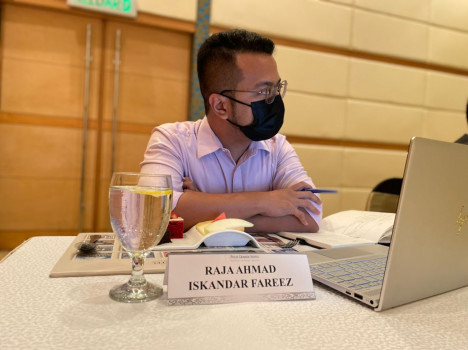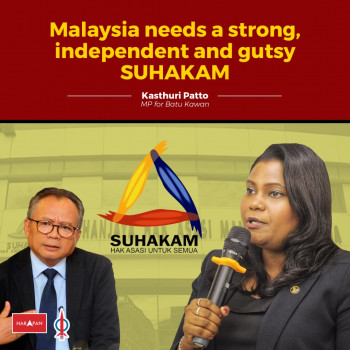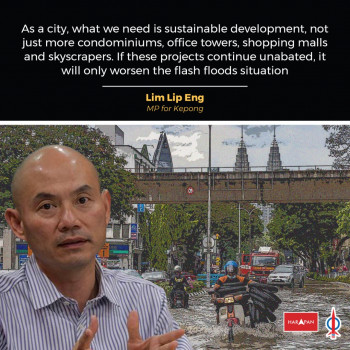by Boon Kia Meng
Keep Calm & Make History
Malaysians would do well to keep that in mind after Parliament was dissolved yesterday, paving the way for the nation’s 13th General Elections.
I posted this message as a Facebook status, following the Prime Minister’s announcement:
‘GE13 is no doubt an exciting juncture in our country’s history. We need to tell ourselves, the KEY is always the LONG-TERM.
Get involved, engaged, campaign, educate, act. But remember, HISTORY is always THE LONG-TERM.’
The Arab uprisings in 2011 gave us an important lesson: the event of change is unpredictable and often overtakes those who are ill-prepared for it.
We, Malaysians, have waited a full five years for the present moment, for a time when we hope our votes can actually change our political landscape. Change is to be had via the ballot box, not through extra-parliamentary means, which is to say, the kind of ‘Tahrir’-style revolutions that has captured the imagination of the world, over the last two years.
Given the current material conditions prevailing in Malaysia, Malaysians are well aware that our very own ‘Tahrir’ moment is unlikely to take shape any time soon (of course, social scientists and observers are often wrong in their prognostications).
The kind of change we would see here is more likely to be a form of incremental change (small policy innovations or reversals, but within a shared ideological framework), as opposed to a sort of fundamental or paradigmatic change (think the New Deal under FDR, or Hugo Chávez in Venezuela, where they both represented major ideological breaks from the prevailing social order, before them), to use the categories so well articulated by the Princeton political theorist, Sheldon Wolin.
Be that as it may, we must always remember that change is indeed a long-term phenomena, that every little step the Rakyat takes, every little democratic muscle the Rakyat flexes in participating in the political process, these small victories do matter, in the larger scheme of things.
For whatever it’s worth, as we cast our votes, come polling day, here are some LONG-TERM, fundamental issues that the Rakyat should keep in mind, in the midst of the frenetic campaign period, knowing that these issues will not go away in the short-term, as they are systemic in nature and deeply endemic in our political culture.
They would require political parties with real cajones (pardon my Spanish) to tackle the following list of issues that materially affect the daily lives of ordinary Malaysians (the list is by no means exhaustive, and I invite my fellow Malaysians to add to it, joining in the conversation on our common destiny). As a form of provocation, I have called them, ‘Eight Things Malaysian Politicians Will Not Talk About in Their Campaign’. Not talking about them does not mean they are not real or make their debilitating effects on Malaysians less acute. Here goes, in no particular order:
The worrying rise of Household debt in Malaysia:
Much has been made of the huge amount of public debt that the BN government has incurred in their administering of our treasury, which amounted to RM455.7 billion at the end of 2011, at 53.8 per cent of GDP (not taking into consideration the state’s guarantee of GLCs’ debts, which is classified as private; another instance where profits are privatized, while the debts are socialized).
What is more worrying is the insidious rise of Malaysian Household Debt, which Bank Negara reported to be at 80 per cent of our GDP, a whopping estimate of RM677 billion in the last year. An academic from a UK university, who researches the issue of debt in Malaysia, told me in rather stark fashion that 80 per cent is an alarming figure, given Malaysia’s middle-income status, where such figures is more likely to be found in advanced capitalist nations such as the UK and the US.
This rising indebtedness of ordinary Malaysians cannot be blamed on the poor financial management or literacy of individual Malaysians; if Malaysians are caught in a system where our real wages have stagnated in the last two decades, and where the prices of essential needs & services such as housing, transport, food have increased unabated, then household debt is a systemic economic necessity, where indebtedness is a primary condition for a Malaysian’s daily survival.
Whichever government we vote into power will unavoidably have to face up to this economically unsustainable state of affairs. In short, we are just one external shock from suffering consequences similar to the ‘subprime crisis’ of 2008, to quote certain economists who responded to Bank Negara’s report last week.
Widening income & wealth inequalities:
The distribution of wealth in the country has widened to such an extent where Malaysia now ranks as one of the most unequal societies in Asia. Studies show that the top 10 per cent of Malaysian households (ie. the wealthy) per capita control 35 per cent of the country’s wealth, while the bottom 40 per cent own only 8 per cent, and this trend is getting worse.
Workers take home only 28 per cent of the wealth produced (as a share of the Gross National Income), while employers take 72 per cent as profits. In more progressive nations, such as Germany & South Korea, the shares of wealth ranges from 40:60 to 50:50. Again, this represents the gross impoverishment of the working class, sinking deeper into debt as a natural result, whilst Malaysia continues to create record numbers of millionaires as reported by Forbes and the like.
Rising inequality is a time-bomb, and if a newly elected state refuses to address this issue, uprisings such as we saw in Tunisia & Egypt will not be a surprise in Malaysia in the coming years.
Exploitation of cheap migrant labour:
Malaysians need to be conscious that one of the reasons for the sustained high levels of profitability of key Malaysian businesses is due to the gross exploitation of cheap migrant labour, where profit is precisely the surplus value that businesses extract from the workers. Already Malaysians are feeling the pinch of rising costs of living, which is artificially cushioned by our economy being parasitic on the labour power of our migrant brothers and sisters. This delayed realization of rising prices is in a sense a direct result of direct subsidies to business profits, at the expense of working class Malaysians, who will be the main group bearing the stress from rising cost of living.
What we need is greater fairness to migrant labour, in terms of their wage levels and better work conditions, whilst at the same time tackling our macro-economic imbalance where businesses have not sought to innovate and compete because they continue to rely on cheap contract migrant labour.
Do Malaysians know that contract labour (put starkly, they are likened to disposable batteries in the industry), was one of those issues that the great pre-Emergency, Malayan Labour movement championed for since the 1920s onwards?
The fact that contract labour is still alive and well in Malaysia today speaks volumes about how much we care for our workers. It is a scourge under the British colonization of the Malayan economy, and it remains so today. Young Malaysians need to know stories about this long Malayan struggle, remembering the vital contributions of labour activists such as Suriani Abdullah @ Eng Ming Ching, who struggled for these demands in the hey-day of the tin-rich Kinta Valley mines, in the 40s.
For the sake of humanity, where millions of our migrant brothers & sisters contribute to our economy and build our cities (from the MRT projects to Istana Negara), we need some kind of fair settlement with them, purely on wages and job security. Dare anyone even talk about charting a progressive route for them towards some sort of limited residency rights, let alone full inclusion as citizens, the way the Obama administration is tackling immigration reform for Hispanics and others?
Ending Uneven Development between the Peninsula and Sabah & Sarawak, and Empowering Indigenous Movements:
The fact that the two riches states in Malaysia, in terms of natural resources and minerals, are actually the poorest, in terms of basic infrastructures and living standards, proves that the kind of ‘trickle down’ developmental economics practiced since the Mahathir-era has failed Sabahans & Sarawakians badly.
We need political space where our Orang Asal brothers & sisters will speak and champion their own rights and concerns, where other civil society groups act as allies and partners, instead of the old model of ‘us empowering them’, which is condescending and merely reproduces the kind of power relations which make our indigenous brothers & sisters passive victims, and not the active political subjects that they are. The global rise of indigenous movements everywhere, as expressed in the ‘Idle No More’ campaign, is a sign of new things to come.
Ending the Culture of Dependency & Political Clientelism
This brings us to the BR1M and the myriad forms that populism and political clintelism take hold, in the Malaysian political culture and landscape.
We all know that the BN has perfected this mode of electioneering almost to an art form, where the Malaysian Citizen is reduced to a mere dependent, recipient of State ‘hand-outs’, instead of fully active democratic actors who participate in all public affairs that pertain to our collective destiny as Malaysians.
BR1M is surely the latest incarnation of a long series of measures that continue to engraft Malaysians into what sociologists has called the ‘libidinal economy’, where our daily habits and beliefs are so identified with certain patterns of consumption and enjoyment, that reason is powerless to guide our actions as citizens. We have often heard stories of how entire villages of people in Sarawak can be pacified to vote for Taib Mahmud with crates of alcohol and pounds of meat, in spite of these very voters knowing that the Chief Minister is mired with countless allegations of corruption.
Will Pakatan Rakyat be able stop this debilitating culture in Malaysian politics? We will have to wait and see.
Local Council Elections & Participatory Democracy
Come next year, it will be exactly 50 years since local council elections was abolished in Malaysia, in 1964. Politicians, especially those in power, are extremely jealous over the amount of power they have in decision-making, and we see there seems to be a reluctance to return the crucial ‘Third Vote’ to the Rakyat, on both sides of the political divide.
If Malaysians want to be full participants in the affairs that actually shape their daily lives, particularly as 70 per cent of our population live in urban areas, it is absolutely critical for politics of the city council to be opened once again to the people who inhabit the cities. Right now, the politics of urban space and development is dominated by unelected councilors and mayors, who at best act as mere functionaries of property developers and financial elite, whilst the basic democratic rights of local residents are disregarded. The basic need of housing is becoming increasingly unaffordable, particularly Malaysians in their 20s and 30s.
Local area development should be brought under popular control, much like how the communal and neighbourhood councils in Porto Alegre, Brazil and Caracas, Venuzuela, where local residents decide on their city’s spending budgets. People need to experience the power that they actually have in shaping the quality of their day-to-day living.
‘We are the subjects of policy, not mere objects of policy’, as they say in Brazil, and that is what true democracy should be, at the local level.
Embracing Minority Rights, LGBTIQ, Workplace Equality (Unionisation) & Gender Equality
One can be pretty sure that during this election campaign, not many politicians would dare to speak up for the rights of the marginalized groups in society, precisely because the game of elections means capturing the majority vote.
We can ignore the just claims that minority groups have on our common life during campaigns, but ultimately democracy would not be sustainable without the fundamental principle of equality being actualized in our daily lives. Democracy deepens and citizenship is enlivened only if we progressively make equality concrete in the different dimensions of our human lives, namely our sexuality, culture, language, religion, workplace, and gender roles.
States will not do this for us, but the Rakyat can and must.
Ecological & Environmental Justice
Finally, this is possibly the first time in our election history where the green movement in Malaysia has got mainstreamed as it were, given the notoriety of Anti-Lynas campaign, the heroic march of the Langkah Lestari and the Orang Asal’s defence of their rivers & environment in Sarawak.
Will this grow into a much larger movement for ecological justice that will challenge Malaysians’ collective habits of material consumption and uses of nature? Will we be able to stop the proposed plans for a nuclear power station in Malaysia, in the not too distant future?
One may be hard-pressed to hear environmental issues at our public ‘ceramahs’, unless you are in Bentong & Kuantan, Pahang.
These are some of my tentative thoughts, as the grueling campaign period starts, possibly the most exciting election campaign in our nation’s history. No doubt the immediacy of events and current concerns will dominate the electoral discourse. Issues on corruption, racial politics, economic prosperity and good governance will take centre stage.
A recent pre-election forum posed the question, ‘Who will win in GE13?’ The real question should have been ‘Will the Rakyat win in GE13’. We will know that Malaysian democracy has truly matured when the Rakyat transitions from being mere objects of politics into real subjects of politics.
History, it seems, is not without a sense of irony. The MCA, with its historical links with the KMT in the past, recently launched their election campaign slogan of ‘Stability over Chaos’. I cannot help but think it’s the KMT’s arch-nemesis, Mao Zedong, who may have coined the more appropriate slogan for GE13:
“There is great chaos under heaven—the situation is excellent.”
______________________________________________
* This article first appeared in The Malaysian Insider and the views expressed here are the personal opinion of the columnist



